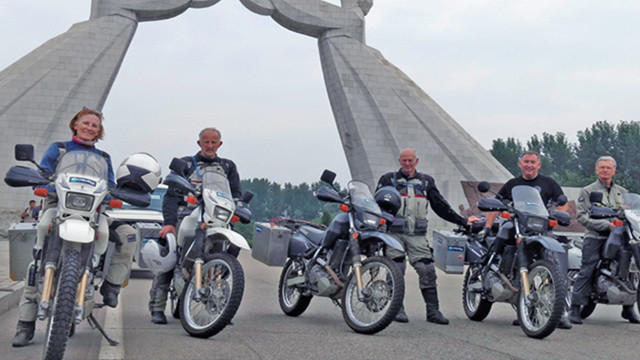Hey, British xenophobes: Ever wonder where all those Romanian immigrants who’ve been stealing your jobs have been spending your money? On the building of strange, gigantic mansions that no one lives in, and the planning of extravagant funerals back in their hometowns, apparently. Romanian photographer Petrut Calinescu hung out in the northern part of Romania for a while looking at how the culture of emigration has changed the landscape of traditional Romanian villages.
I called him up to talk about his project, Pride and Concrete.
VICE: How did Pride and Concrete come about? What is the idea behind it?
Petrut Calinescu: Northern Transylvania, where these pictures were taken, is a place I’ve visited a lot as a photographer in the last ten to 15 years. In the beginning, I was fascinated by how the rural part of this area preserved their traditions and their way of primitive subsistence farming. But, slowly, that changed—people left to work abroad and the villages became deserted overnight.
Videos by VICE
My frustration grew, because I was looking for that kind of romantic image depicting the last peasants, but there were more and more modern mansions and foreign cars spoiling my idyllic pictures. I realized then that there was a story developing in my pictures of how the traditional world and the modern one coexist, because of the people working abroad sending money back home.

What was that story developing in your pictures?
During the year, some villages in Romania are left deserted. They’re completely silent, and the only sound you’ll hear is the sound of concrete mixers, while the village elders walk around construction sites like inspectors. The villages come back to life in August, when everybody travels back home to attend weddings, which traditionally are between Romanian emigrants. There can be up to 60 weddings in the span of a couple of weeks.
What is the alternative way of life for someone who stays in Romania?
There aren’t too many opportunities since the agriculture and industrialization collapsed. Everybody is seeking a way to escape. Only a few young people are going to neighboring cities to study. But studying isn’t really popular, because it’s a long-term investment and a degree doesn’t guarantee a big salary, which is a bummer when compared to doing manual labor abroad.
Why do the people build these mansions if they live abroad?
Almost all the people who left are planning to return at some point. Until then, they work hard and save the money to invest into a nice little retreat for their return.

Do you know how much of the money comes from those working abroad?
I think each family has at least one member who is working abroad. Before the global economic crisis, Romania’s economy was on the rise. But it wasn’t because we did something special, it was solely because of the money sent back by emigrants being spent on the ground.
On your website you mention that the locals look down on the emigrants. Why is that?
I’m not sure there’s a particular reason. I think a lot of simple people work hard abroad, and once they’re back with more money than a professor can earn in his lifetime in Romania, they can act a little silly looking for recognition of their new status as a rich man. And the “professors” don’t necessarily appreciate that, either.
Do a lot of people actually come back to live in their big houses?
Not really. The majority stay abroad. Only a few of them work with legal papers, which means there isn’t a pension waiting for them in Romania.
Don’t you think it’s hard for them to return? I would imagine the country has changed a lot since the time they left.
It’s difficult to say, because each village, each community, has its own way of relating with Western Europe. There are villages that people leave for only three to six months a year, so they are already more at home that abroad. For the ones who live abroad full-time, the most difficult part will be to convince their children, who are attending European schools, to go back and restart a life in Romania.
Thanks, Petrut.
Petrut is in the middle of a crowd-funding campaign to publish a book of this project. Show your support by clicking here.
Follow Paulius on Twitter: @paulius_ka
More photos of people from around the world:




